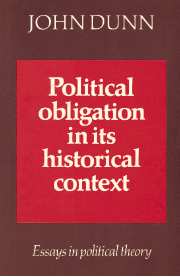3 - Consent in the political theory of John Locke
Published online by Cambridge University Press: 22 August 2009
Summary
It is widely agreed that the notion of consent plays a central role in the political theory which Locke sets out in the Two Treatises of Government. Professor Plamenatz, Mr Gough, Professor Kendall and Professor Waldmann all discuss the notion as though it were the fulcrum of that theory. It is also widely assumed that the Two Treatises of Government is a simple abstract of Locke's formal political reflexion and that it must contain in a readily ascertainable form all the basic premises of his political reasoning. More pointedly (since that is the character which works of political theory are supposed properly to display) it is presumed that it contains both a theory of political obligation and a theory of how political life both is and should be conducted, a normative and descriptive theory of the polity. These assumptions do not appear at first sight very misleading – it might seem that, if true, they would designate clearly the area to be analysed and, if false, they can readily be seen to be so. But paradigms for the conduct of investigations can do much to determine the perceived results of the investigations. The point of this paper is to discuss a typical misunderstanding which seems to me to derive from an improper paradigm.
The place of consent within the theory of the Two Treatises is simple, if frequently misunderstood.
- Type
- Chapter
- Information
- Political Obligation in its Historical ContextEssays in Political Theory, pp. 29 - 52Publisher: Cambridge University PressPrint publication year: 1980
- 3
- Cited by



